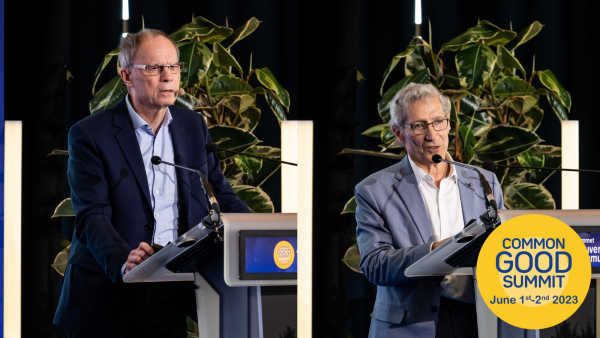On the occasion of the Common Good Summit, TSE, Challenges and Les Echos Evènement were delighted to welcome Ariel Pakes, Harvard economist and Chairman of TSE's Scientific Advisory Board.
Together with Jean Tirole, Honorary President of TSE, they discussed the challenges of defending the common good in the healthcare sector.
For Jean Tirole, the key lies in well-designed public policy to enable Europe to exist in the new biotech landscape. "Today, three of the world's top 15 pharmaceutical companies are European, but what about tomorrow? In order to succeed in the face of this situation, we need to take up three challenges:
"First, neglected diseases. R&D is naturally insufficient when its financial returns cannot cover research expenditure. Many therapeutic innovations are handicapped by a small number of patients or limited ability to pay. In all these cases, intellectual property is not enough to encourage companies to carry out the appropriate research. Only an intelligent industrial policy can solve the problem of these neglected diseases.
We need to use the right mix of policies to encourage R&D, not only through traditional tax credits, but also through the creation of an independent European innovation support agency with appropriate governance. We need to prevent industry from delaying the market entry of generics or biosimilars." Three challenges for success in healthcare u demand by guaranteeing minimum purchases at attractive prices for companies.
Then we need to capitalize on returns to scale. As in many other fields, we need more Europe. The colossal sums involved in cutting-edge R&D call for greater collaboration between EU members in their push-and-pull policies, i.e. to support R&D spending and create internal demand. The example of antibiotics - whose lack of new classes could well be at the root of the next pandemic - speaks for itself.
Complex question
Finally, we need to regulate intelligently. Drug prices are always the subject of controversy in public opinion. It seems only natural to regulate prices to avoid the American excesses in this area. We absolutely must prevent the creation of quasi-monopolies not linked to substantial innovation. We all have in mind the astronomical prices of insulin in the United States, totally disconnected from the remuneration of a disruptive innovation! Numerous policies can help limit such opportunistic behavior: importing generics, monitoring mergers and acquisitions to prevent a company from acquiring a molecule similar to its own and putting it on the shelf. Similarly, the industry must not be given the opportunity to delay the entry of generics or biosimilars.
The issue is much more complex for innovative drugs, those for which the medical service rendered is significant. The case of anticancer drugs, which today can cost several hundred thousand euros, is typical of the difficulties we'll encounter in the future. We need to find an economic model for laboratories that does not overly compromise access to care or jeopardize the balance of the health insurance system. While the subject is complex, there are a few general principles we can apply.
To take just one example, the introduction ten years ago of Sovaldi, a definitive treatment for hepatitis C with no side-effects, entailed a significant health expenditure (30,000 to 40,000 euros per person), but was almost negligible compared with the long-term costs to infected individuals and to the healthcare system of this serious chronic disease.
Wealthy countries must also recognize that innovations don't just fall from the sky, and that they have a responsibility towards the rest of the world; quite apart from any ethical considerations, healthcare is also one of the most effective transfers of resources to developing countries. Wealthy countries themselves are already benefiting from these new medicines and the scientific spin-offs of the associated research, and, with the expiry of intellectual property rights, from generics. The corollary of the social contract is that we must accept our responsibilities and contribute to the development of the medicine of the future.
Ariel Pakes delivers an edifying speech on the unstable balance of pharmaceutical research:
"Although the benefits of pharmaceutical research are difficult to quantify, $1 invested in pharmaceutical research is probably more beneficial to consumers than $1 invested in any other industry. That said, we still need to be cautious when it comes to new pharmaceutical products.
As I see it, there are two types of pharmaceutical research: research funded by government agencies, universities, research labs... and which produces an internalization of benefits and advantages across borders; and a second type of research, conducted by pharmaceutical companies, which is more applied research, knowing, of course, that companies aim to optimize their profits. Let's look at some figures. The amounts allocated to research vary from country to country.
In the United States, for example, investment in research amounts to $135 billion, or 0.21% of GDP. You can compare the figures with those for Europe. In Europe, the figure is only 0.07% of GDP. In France, government spending amounts to 127 million, or 0.004% of GDP - fifty times less than in the United States!
Let's move on to corporate profits. These are essentially determined by price differences between countries, since production costs are often similar, and very often quite low. American prices for pharmaceutical products are generally much higher than in Europe. In 2020, the General Accounting Office, an office of the US Congress responsible for auditing the use of public funds, compared the prices of some twenty best-selling drugs: they were two to four times higher on the US market than in other countries, and I believe this is an underestimate.
Here are two examples of blockbusters I'd like to mention, which explain the price differences. Take Humira, an anti-arthritis drug: its price is the equivalent of $1.09 in France, $1.57 in Germany, and $4.48 in the United States. As for Keytruda, a drug used to treat lung cancer, the price is $87 in the US, $34 in the UK and $27 in Germany. These figures speak for themselves. These drugs are considerably cheaper on the European continent.
Heavy consequences for research policy
Although the production costs of new drugs are lower in the USA, the benefits are not proportional, if we look at what happens in the USA and Europe. How can we explain all this? It may all come down to political attitudes as practiced on different continents and in different countries. If we look at the United States, we see that Americans pay much higher prices for medicines than in other countries. This has led the current administration to modify pharmaceutical policy under the IRA (inflation reduction act), which was passed in 2022. Public health insurance programs in the United States, Medicare and Medicaid, which account for 57% of American spending on drugs - and 40% of the global market - will be authorized to negotiate prices with pharmaceutical companies, which was not the case until now.
This means that industry profits, two-thirds of which are currently made in the USA, could fall by between 20 and 25%! And this will have serious consequences for the research policies of major laboratories, wherever they are based.
In conclusion, I'd say we're in a very unstable balance when it comes to funding pharmaceutical research. The US pays a disproportionate share of the costs, and citizens actually receive less than they should. This is leading to changes in US policy, with very negative implications for drug research. If there is no change, we must be prepared to see sharp cuts in investment, which will obviously create a brake on progress to combat morbidity and mortality, with a considerable impact worldwide, since we supply the whole world with new molecules."
- More information on Jean Tirole





